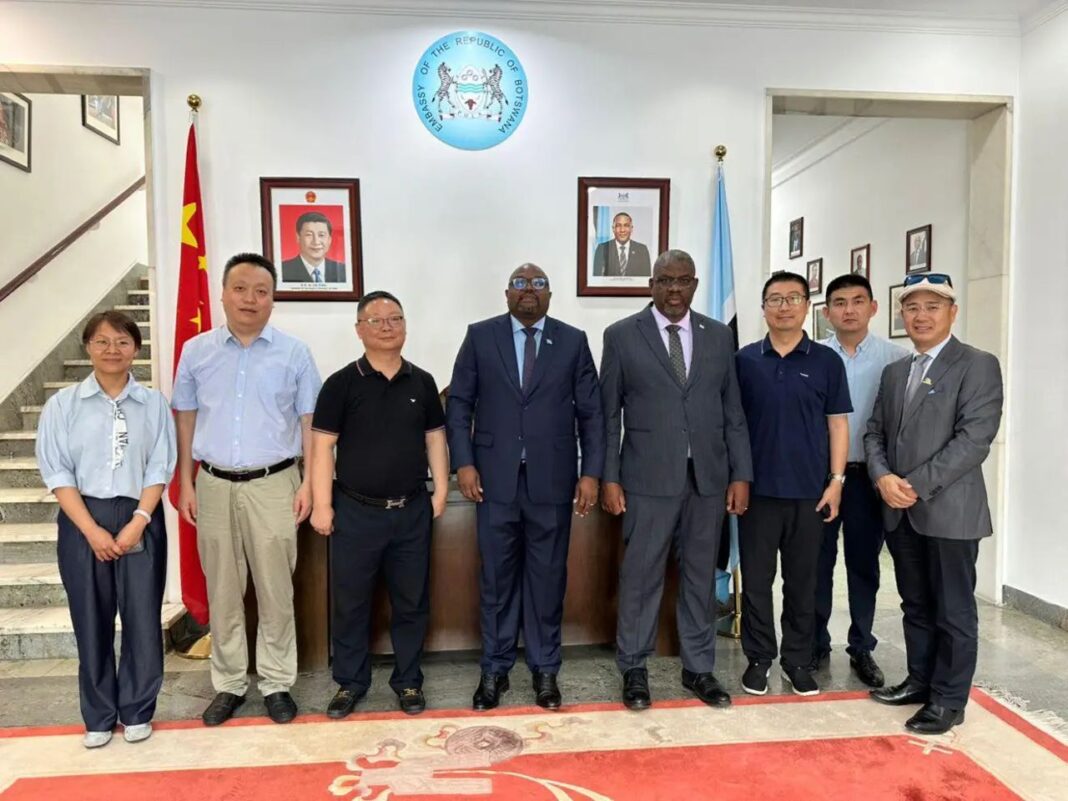Botswana’s beef industry is poised for a significant transformation following a landmark commitment of 1 billion Pula (approximately USD $73 million) from China’s Beijing AgriFam Co. Ltd. This substantial investment, aimed at developing crucial feedlot infrastructure, is set to prepare Botswana beef for direct export to the lucrative Chinese market. The move is facilitated by a newly forged partnership with the influential CITIC Group, which will handle distribution in China. This pivotal announcement, made by the Ministry of International Relations, Botswana, underscores a strategic moment for the southern African nation’s agricultural sector, leveraging a recently signed beef protocol between the two countries.
A Billion Pula Boost for Botswana Beef
Beijing AgriFam Co. Ltd has formally committed 1 billion Pula towards the development of advanced feedlot infrastructure in Botswana. This substantial financial injection is specifically earmarked to enhance Botswana’s capacity to prepare its beef to meet the stringent quality and volume requirements for direct export to the vast Chinese market. The investment signifies a strategic commitment to modernising and industrialising a key segment of Botswana’s beef value chain, aiming to ensure a consistent supply of high-quality beef for international trade
The explicit focus on developing “feedlot infrastructure” suggests a deliberate and strategic enhancement in Botswana’s beef production methods. This move towards more controlled, intensive systems is critical for meeting the scale and consistency demanded by a large international market like China. While Botswana is renowned for its free-range beef, a detailed study comparing feedlot and free-range cattle management in Botswana highlights that feedlot animals consistently achieve a significantly higher carcass dress mass (CDM), averaging 237.56 kg compared to 184.50 kg for free-range cattle. Furthermore, feedlot cattle are graded as prime significantly more often, reaching 100% prime grade compared to free-range cattle, which are typically graded as grade 1 or 2. This direct correlation between feedlot production and superior carcass quality and mass for export markets indicates that the investment is not merely about increasing quantity, but fundamentally about improving and standardising the product to meet the specific demands of a discerning international buyer like China. This represents a strategic evolution in Botswana’s beef production model, which is designed to ensure the product is competitive and appealing in the global arena.
Strategic Partnerships Driving the Deal
The investment announcement follows high-level discussions held in Beijing, where Botswana’s Minister of International Relations, Dr. Phenyo Butale, engaged directly with the top leadership of Beijing AgriFam Co. Ltd. This high-level engagement underscores the significant governmental backing and diplomatic importance attached to this deal. Dr. Butale is known for his strategic diplomacy and commitment to strengthening Botswana’s global partnerships.
A critical component of this new venture is the partnership with CITIC Group, one of China’s most influential state-owned conglomerates. CITIC Group will play a dual role, responsible for purchasing the beef directly from the newly developed feedlots and subsequently managing its distribution across China, thereby establishing a streamlined and integrated supply chain from source to consumer. CITIC Agriculture, a subsidiary, is committed to building a globally competitive agri-tech business and improving its investment and management capabilities. This explicit role in both purchasing the beef from the feedlots and distributing it within China signifies a strategic move towards vertical integration or tight control over the supply chain by the Chinese partners. This approach is designed to minimize risks, ensure consistent quality standards from the point of production to the end consumer, and secure a reliable, high-volume supply for the vast Chinese market. By controlling both the procurement at the source and the distribution in the destination market, the Chinese partners are establishing a robust, end-to-end system, a common strategy for major importing nations to secure critical resources and ensure quality control.
Unlocking the Chinese Market: A New Era for Botswana Beef
This significant investment directly capitalizes on the recently signed Beef Protocol between Botswana and China. The protocol, formalized on the sidelines of the Forum on China-Africa Cooperation (FOCAC) meetings in June 2025, is pivotal as it grants Botswana beef unprecedented access to China’s vast and lucrative consumer market. For Botswana, this agreement transcends a mere trade deal; it represents a strategic partnership poised to drive economic, social, and agricultural development.
Experts anticipate that access to China’s large market will provide a substantial boost to Botswana’s beef industry, significantly enhance export revenues, and invigorate local economies. Crucially, this new market access enables Botswana to diversify its export destinations, reducing its historical reliance on traditional markets such as the European Union and South Africa. While the European Union has historically been a critically important market for Botswana beef, offering unlimited preferential market access and higher returns for farmers (60% more than South African export prices) , the new beef protocol with China signifies a deliberate and strategic move by Botswana to broaden its export portfolio. This proactive diversification is aimed at reducing economic vulnerability to single-market fluctuations or geopolitical shifts that could impact trade policies, thereby enhancing Botswana’s long-term economic resilience and stability.
Furthermore, the strong alignment between China’s growing demand for premium, hormone-free beef and Botswana’s established reputation for producing high-quality, often grass-fed, beef positions the southern African nation favorably in this new trade relationship. The agreement is seen as a crucial lifeline for Botswana’s meat industry, which has struggled with financial instability and declining output for years.
Botswana’s Beef Industry: A Critical Economic Pillar Facing Challenges
Livestock production, with beef at its forefront, stands as a cornerstone of Botswana’s economy, consistently generating over 80% of the nation’s agricultural GDP. Historically, Botswana’s beef industry has demonstrated remarkable competitiveness in international markets, distinguishing itself as the only agricultural commodity for which the country is a net exporter. In 2019, Botswana was the ninth largest exporter of beef to the European Union, benefiting from zero-tariff entry under the EU-SADC Economic Partnership Agreement.
Despite its profound significance, the industry has contended with considerable challenges in recent years, marked by periods of financial instability, declining output, and a worrying decrease in cattle herd numbers. Export earnings from fresh and chilled beef products, a key indicator of the sector’s health, plummeted from USD 62 million in 2015 to a mere USD 29 million in 2019. A significant portion of Botswana’s cattle (approximately 80%) is owned by smallholder farmers. Their cattle numbers have seen a notable decline, from over 2.25 million to less than 1 million between 2011 and 2019, contributing to an estimated 60% fall in output from the traditional sector during this period. This quantitative evidence paints a clear picture of an industry in deep distress.
Botswana’s cattle rearing predominantly employs two management systems: free-range and feedlot. Free-range farming accounts for over 80% of the total cattle population, celebrated for producing beef with a unique taste attributed to natural pasturing, yet often yielding lower carcass weights for export. In contrast, feedlots, while more intensive and reliant on imported feeds, are crucial for producing higher carcass weights and prime grades essential for meeting international export standards. Currently, only about 20% of Botswana’s cattle meet the stringent requirements for export to the European Union. Against this backdrop of struggle, the Chinese investment is widely perceived as a much-needed “lifeline” for the beleaguered sector, offering a rare and critical opportunity for revitalization and growth. The substantial investment and new market access directly address these critical challenges, positioning the deal as a vital intervention for the sector’s recovery and future prosperity.
A key underlying challenge for Botswana’s beef industry, amplified by this new export opportunity, is the inherent tension between its prevalent free-range cattle management system and the imperative for feedlot development to meet the high-volume, high-quality standards required for lucrative international markets like China. The majority of cattle owners are smallholders using free-range methods, which are culturally important but yield lower carcass weights and grades for export. The new investment is specifically in feedlots. The success of this venture will largely depend on how effectively Botswana can manage to integrate or balance these two distinct production systems. This includes ensuring that the benefits of modernisation extend to smallholder farmers and that traditional practices are either preserved or adapted in a way that allows for participation in the new, export-oriented supply chain, thereby ensuring that the promise of “invigorated local economies” is broadly realised.
Future Outlook and Broader Implications
The planned visit by Beijing AgriFam and CITIC Group leadership to Botswana in July, specifically to finalize discussions with the Botswana Meat Commission (BMC), signals a rapid and determined progression towards implementing this significant investment and operationalizing beef exports to China.
If this beef export venture proves successful in boosting Botswana’s economy and demonstrating effective partnership, it could create a powerful multiplier effect. This success would serve as a strong case study, potentially attracting more foreign direct investment into Botswana’s agricultural sector and other industries, further solidifying the nation’s appeal as a stable and profitable investment hub in Africa. Botswana is already proactive in attracting investment through the BITC and its strong governance. A high-profile, successful project like this, involving major Chinese entities, would significantly enhance Botswana’s international investment profile, potentially leading to a cascade of further foreign direct investment across various sectors.
Beyond the immediate economic benefits, this strategic partnership is expected to deepen diplomatic ties between Botswana and China, fostering a multifaceted relationship with significant long-term geopolitical and economic advantages for both nations. However, as Botswana embraces the expansion of feedlot operations, a crucial aspect will be the careful consideration of environmental sustainability. While the economic benefits of expanding feedlot operations are clear, this growth also introduces inherent sustainability challenges that require proactive management. These include the reliance on imported grains for feed, which can be subject to global market volatility and have their own environmental footprint, efficient water management in Botswana’s arid climate, and the effective handling of waste generated by concentrated animal operations. Botswana will need to carefully balance the pursuit of rapid economic growth with robust environmental and animal welfare practices to ensure the long-term, sustainable success and international acceptance of its beef industry.
Conclusion
The 1 billion Pula investment from Beijing AgriFam Co. Ltd, facilitated by CITIC Group, represents a pivotal moment for Botswana’s beef industry. This strategic partnership, underpinned by the recently signed beef protocol with China, offers a critical lifeline to a sector that has faced significant challenges, promising to revitalise export revenues and invigorate local economies. By diversifying its export markets beyond traditional partners like the EU and South Africa, Botswana is strategically enhancing its economic resilience and global standing. The focus on feedlot infrastructure signifies a deliberate move towards optimizing beef production for high-volume, high-quality international markets, aligning with China’s demand for premium beef. This landmark deal also underscores Botswana’s strength as an attractive investment destination, leveraging its reputation for sound governance and a stable economic environment. For the long-term success of this venture, Botswana will need to navigate the inherent complexities of balancing economic growth with environmental sustainability, particularly concerning feedlot operations, to ensure the continued prosperity and international acceptance of its beef industry.



